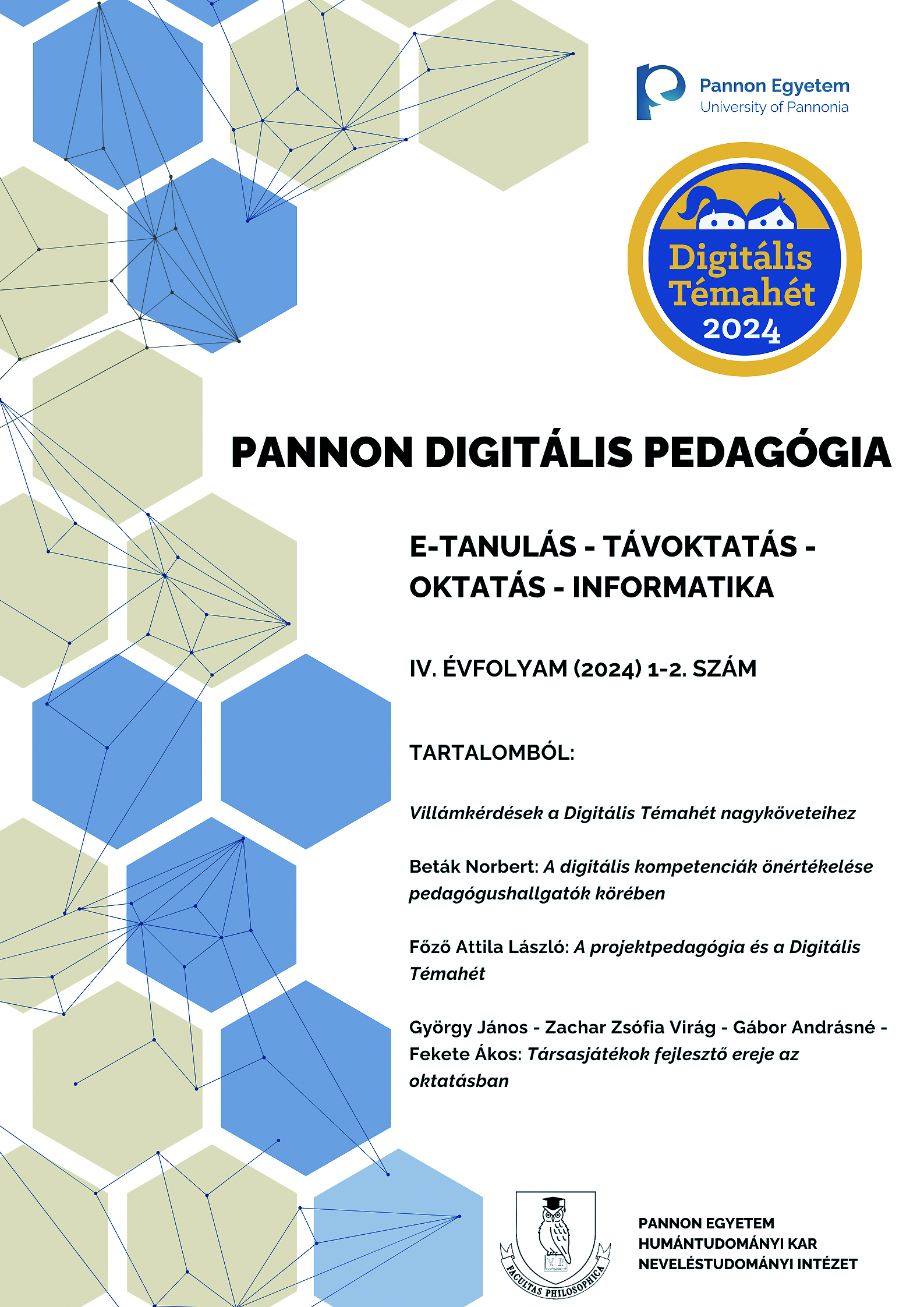A projektpedagógia és a Digitális Témahét
DOI:
https://doi.org/10.56665/PADIPE.2024.1-2.2Keywords:
project-based pedagogy, project-based education, Digital Project Week, digital competenceAbstract
The project method has undergone numerous transformations over the centuries, leading to the development of what we now refer to as project-based pedagogy. In the realm of project-based education, various models, approaches, and definitions have emerged, many of which continue to hold significance today. Although project-based education, which periodically experiences surges in popularity, seemingly retains much of its early 20th-century roots, the meanings of its concepts and objectives have shifted over time due to societal and technological changes. For nearly a decade, Digital Project Week, the largest digital pedagogical program in Hungary incorporated into the academic calendar, has been advancing the digital competencies of students and educators through the tools of project-based pedagogy. By presenting key milestones in the development of project-based pedagogy, this study highlights Digital Project Week and its project-based educational model, while also addressing the development of skills that are of critical importance in the digital age.
References
Emer, Wolfgang – Lenzen, Klaus-Dieter (2009): Projektunterricht gestalten – Schule verändern. Schneider Hohengehren, Wien.
Falus Iván (szerk.) (2003): Didaktika. Nemzeti Tankönyvkiadó, Budapest.
Flavell, John H. (1999): Cognitive development: children’s knowledge about the mind. Annual Review of
Psychology. Vol. 50. pp. 21-45.
Főző Attila László–Jánossy Zsolt (szerk.) (2022): Projektpedagógia digitális eszközökkel – a Digitális Téma-
hét kézikönyve. Digitális Jólét Nkft., Budapest, ISBN 978-615-81901-3-8. 92-93. https://digitalistemahet.hu/hir/projektpedagogia-digitalis-eszkoezoekkel, utolsó letöltés: 2024.08.10.
Gabora, L Liane–Unrau, Mike (2019): The role of engagement, honing, and mindfulness in creativity. In Mullen, C. (Ed.), Creativity Theory and Action in Education: Vol. 3. Creativity under duress in education? Resistive theories, practices, and actions (pp. 137-154).
Hegedűs Gábor (2002): Projektpedagógia, Kecskeméti Főiskola Tanítóképző Főiskolai Kar, Kecskemét.
Hortobágyi Katalin (2002): Projekt-kézikönyv. Válogatás a hazai és a külföldi projektirodalomból. IF Alapítvány OKI, Budapest.
Kilpatrick, William Heard (1918): The Project Method, New York: Teachers College, Columbia University
http://www.educationengland.org.uk/documents/kilpatrick1918/index.html, utolsó letöltés: 2024.08.10.
M. Nádasi Mária (2010): A projektoktatás elmélete és gyakorlata, Magyar Tehetségsegítő Szervezetek Szövetsége, Budapest
Mirel, Jeffrey (2005): Régi nevelési elvek, új amerikai iskolák, Iskolakultúra 2005. 4. http://real.mtak.hu/6
/1/EPA0 0011_iskolakultura_2005_04_065-083.pdf Utolsó letöltés: 2024.08.10.
Paragina, Silviu–Paragina, Florica–Jipa, Alexandru (2010): The Intel Teach (R) Program Versus traditionally education paradigm. Procedia – Social and Behavioral Sciences. 2. 4054-4058.
Sart, Gamze (2014): The Effects of the Development of Metacognition on Project-Based Learning. Procedia –Social and Behavioral Sciences. 152. 10.1016
Vincze Beatrix (2011): Elméleti, történeti és gyakorlati adalékok a projektpedagógiához, ELTE Eötvös Kiadó, Budapest.
Vuorikari, Riina– Kluzer Stefano–Punie Yves (2022): DigComp 2.2: The Digital Competence Framework
for Citizens – With new examples of knowledge, skills and attitudes, EUR 31006 EN, Publications Office of the European Union, Luxembourg, ISBN 978-92-76-48883-5
Yu Hao. (2024): Enhancing creative cognition through project-based learning: An in-depth scholarly exploration, Heliyon, 2024 Mar 12;10(6)

